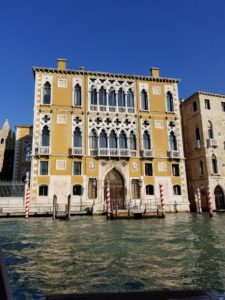 “I believe we will be quite comfortable here, and the dampness need not be a concern,” Elizabeth told her husband after an inspection of their fantastical and antique “new” quarters at the Palazzo Moncenigo. “These crumbling palaces on the Grand Canal have such a ruinous beauty, there is a strange enchantment about them.”
“I believe we will be quite comfortable here, and the dampness need not be a concern,” Elizabeth told her husband after an inspection of their fantastical and antique “new” quarters at the Palazzo Moncenigo. “These crumbling palaces on the Grand Canal have such a ruinous beauty, there is a strange enchantment about them.”
“I always wanted you to know them,” said Darcy. “This place is the very essence of romance, is not it?”
“Oh, yes. And really, I should not have worried about the children. These apartments are perfectly healthful.“
“Of course,” exclaimed Mr. Darcy, “I did make the most careful enquiries. Other English travelers are venturing into Italy now, and these quarters were particularly highly recommended. There are fireplaces enough, you see, and in winter a good supply of clean rainwater – I should not attempt Venice in the summer months, but we will be back home in England by then. The market at the Rialto is quite close by with the freshest food, and there are servants aplenty.”
“That Venetian cook is a gem,” agreed Elizabeth, “and our own servants can make simpler food for the little ones. Yes, I do believe our lodgings will suit extremely well, and we will have a happy time. I can hardly wait to try strolling by the canals of Venice with you. How delightful!”
“And when we get tired, we can slip into a gondola,” said Darcy, with an arch smile. “We can go exploring whenever we like. I would not care to entrust the children to only Venetian servants, but our own people can look after them very well.”
“Yes, this house – or palazzo – seems to be very smoothly run. If it is good enough for Lord Byron it must do for us,” Elizabeth laughed. “I wonder if we shall see anything of him?”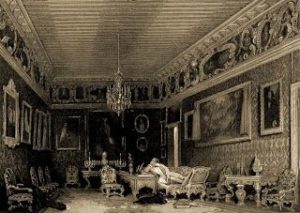
“Oh, I doubt it,” said Darcy. “You can see that Palazzo Moncenigo consists of four buildings; our second floor piano mobile apartment is in the Casa Nuovo, the leftmost palazzo. It is the second oldest, I believe, sixteenth century. Lord Byron’s palazzo is the second from the right; I am told it is a Palladio design, and that his lordship is renting it for four hundred pounds per anno. With his menagerie.”
“Gracious! Well, I daresay we will be safe from him, then, two houses away, though I hope he does not keep tigers in the garden. There seem to be very beautiful, large grounds, where the children might play – I hope that is not where he keeps wild animals.”
“I should have made more extensive inquiries,” said Darcy, concerned, “but when I heard he was not housed in the same building as ourselves, I asked no farther.”
“You could not be blamed,” Elizabeth was beginning to say, when footsteps were heard and voices raised. A flustered maid opened the salon door, and said, “Forgive me, madam – sir, he would come in – I could not stop him – “ and Lord Byron himself walked through the door, accompanied by two dogs and two monkeys.
“To what do I owe this intrusion – “ began Darcy, rising with dignity, as his Lordship marched directly up to him.
“Forgive me sir, but I am Lord Byron, and you are English!” exclaimed the intruder.
Darcy and Elizabeth stared at him with amazement. He was such a figure as they had never seen before: a very handsome man, of about thirty, with curly chestnut hair and a noble forehead as became a poet, but most striking of all was his expressive countenance, so mobile, so alive, that it attracted their interest and attention, in spite of their extreme surprise.
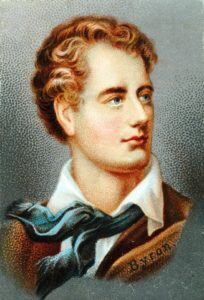
Darcy recovered enough to say, “Both are self-evident facts. I am Fitzwilliam Darcy, of Pemberley, and this is Mrs. Darcy.”
Byron bowed, and seemed to collect himself after his initial discomposure. “Darcy – of Pemberley?” he exclaimed. “But of course, I know who you are – owner of the finest library in Derbyshire, if I am not mistaken. I only wish I had been told your name before, then we might have escaped this awkwardness. I fear I owe you many apologies, sir. And madam.”
“I am glad you know my library, if not myself,” replied Darcy, with a bow, “and be assured that it does contain several volumes of your Lordship’s work, which my wife and I have enjoyed perusing.” Elizabeth curtsied in corroboration.
“But to what do we owe your interest, if I may ask?” he pursued. “What is this, about our being English?”
“I will tell you, if you will grant me the pleasure,” said Byron.
“Certainly,” said Elizabeth, “Please be seated, and will you have some tea?”
He looked at her in amusement. “You are English, indeed, and I have foresworn tea.”
“Something stronger then,” suggested Darcy politely.
“Your hospitality is remarkable, and most appreciated, considering the rudeness with which I have treated you. If I may, a glass of milk – ? My diet is singular. And I hope my animals are not a trouble to you. They are very well behaved, and tame; your little ones will be quite safe, with the dogs, and the monkeys.”
Darcy nodded to five-year-old Charles, who had been sitting on a satin sofa with his younger sister, Jane, all eyes, gazing at the animals. The baby, Fitzwilliam, slept in his cradle, but Charles and Jane trotted forth and soon were engaged in laughing and patting the pets.
“What beautiful children,” said the poet wistfully. “I have two little daughters, but I never see them. It is very sad.”
“That is a sad circumstance, indeed,” said Elizabeth with sympathy. “Are they in England?”
“Yes, my older girl, Ada, is with Lady Byron. She is two and a half years old now, but I have not seen her since her birth. She is my legitimate child. And there is a new one, born this spring – a natural daughter, Allegra. Named her after a Jewish bluestocking, but I have not laid eyes on her yet. I believe I will have her bringing up, however, with any luck. Her mother is not capable.”
Elizabeth lowered her eyes, not sure what to say to this talk about legitimate and illegitimate children, and Darcy tried to change the subject.
“So you came to see us because we were English, did you, my Lord?” he asked.
Byron laughed. “No! Quite on the contrary. I abhor my own race. I was born to set people by the ears, it seems, and have had nothing but pain from my home country – I detest it. No, to tell the truth, I was incensed at the thought that English people were to be my neighbors!”
“Dear me,” said Elizabeth, “but we are two buildings away!”
“Oh, my apologies, Mrs. Darcy. Your sort of enlightened gentlefolk are not the objects of my hatred. It is that Venice – my Venice – has become pestilential with English this year, since the war ended. A parcel of staring boobies who gape at everything. They crane their necks as I go by in my gondola, they approach me as I walk upon the Lido, ladies slip me notes and steal embraces, and I am at all hours at the mercy of this tribe of wretches and celebrity-seekers. There are no English here except birds of passage. I cannot wait until they tire of the place, and the Continent is roomy and agreeable again.”
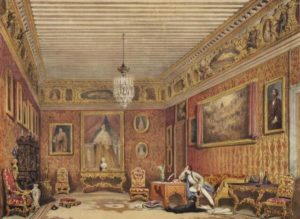
“Well, you are safe enough from us, Lord Byron,” said Darcy somewhat dryly, “and we are birds of passage enough, for we only expect a residence here of a few weeks, and then a stay in Florence will conclude our Italian journeyings.”
“No, no, do not mistake me, you are people of culture and manners, and I am thankful to have such as my neighbors. I shall try to make amends for my barbarous initial treatment of you. I assure you, you will see no more excesses from me.”
“Do you mind telling me about your animals, Lord Byron?” Elizabeth asked. “We heard you had a tiger, and we hope our children will be safe in the gardens?”
Byron laughed. “I am a great lover of animals, Mrs. Darcy, but I assure you I have no dangerous ones, no tigers! My two mastiffs, you see, are very well trained, very polite; the monkeys are harmless; there are several cats, and a tame fox. We did have a wolf, with the manners of a large dog, but it sadly died.”
“And they are all kept in the gardens?”
“Sometimes; or they wander at will in and out of the palazzo, especially when it rains,” said Byron carelessly. “I am afraid I am wilder than my animals, and I hope my irregular sort of life is not at odds with yours, but you do understand that this is Venice. Here you will find that unlawful couples and their intrigues are the rule.”
“I am afraid we are that anomaly, a happily married couple,” said Mr. Darcy, with a look at Elizabeth, “and hope that fact will not cause you any discomfort.”
“Of course it will not,” said Byron civilly, “Live and let live. I hope – “
At that moment screams were heard from the garden side of the house and an agitated young woman burst into the salon from the other end. She was a beautiful girl, or would have been had her hair not been disordered with her agitation, and her expression contorted in rage. Her shouts seemed to consist of loud complaints in the Venetian patois, so rapidly delivered that neither Darcy or Elizabeth, with only a slight knowledge of Italian, could comprehend.
“Margarita! Be quiet – how dare you – “ spluttered Byron, holding her by the shoulders and then speaking firmly in Italian so she quieted somewhat. He apologetically turned to his hosts.
“This is what I was speaking of, this being pursued constantly,” he explained.
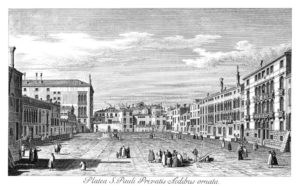
“But she is not English,” Elizabeth pointed out, bewildered.
“You are quite right, of course. This is Margarita Cogno, and she is a young madwoman who has long wished to be connected to me, and I have had to throw her out of my house many times, but she keeps returning. Left her husband, a butcher, and threatens to throw herself into the canal. Oh, Lord, it is too hard to explain – she has settled here, and is like a fixture. There is nothing for it, I had better go before making things worse. Come, dogs – again I cannot apologize enough, Mr. and Mrs. Darcy – Margarita, shut up your caterwauling – come – “
And Lord Byron marched out of the Darcys’ apartment, followed by the lamenting woman and the animals, leaving Darcy and Elizabeth staring at each other. At the door he turned back.
“Oh, I say, Darcy – would you like to come to the Island of San Lazzaro with me one day? I have been studying Armenian with the monks there, and I think you would find it curious. They really have a very fine library.”
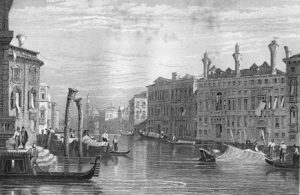
“A library?”
“Yes. I go nearly every day. Unfortunately the Armenian alphabet is impossible, but I wanted a really knotty intellectual chore, and I have found it. I’m compiling a dictionary.”
“I have not heard of San Lazarro,” said Darcy, a little bewildered.
“Then you should come and see it. The monks are most hospitable. If I may make bold to suggest, Mrs. Darcy would find the excursion of interest, too. Have you ever visited a monastery, madam?”
“I – ? Why, no.”
“Please come then, both of you. Would Wednesday suit you? My gondola is tied up down below, and one convenience of our all living at Moncenigo will be the ease of traveling together. I should like to show you some of the sights of Venice, and upon my word, San Lazzaro is the best place of all to visit.”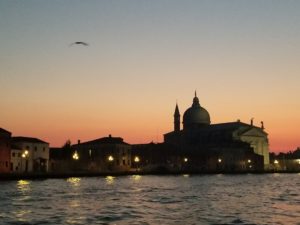
Looking somewhat askance at his wife, who nodded reassuringly, Darcy accepted the invitation.
“Ten o’clock Wednesday, then. So glad to have met you – No, Margarita, I will have nothing to do with you. Go back to your quarters at once.”
Byron strode out.
“Well, if he is not the most extraordinary – “ said Darcy.
“You might say that!”
“I hope you were not too offended, Elizabeth. He is a wild man, that is certain. And his morals must simply pass credence.”
“Yes,” she said thoughtfully, “but do you know, I feel rather sorry for him.”
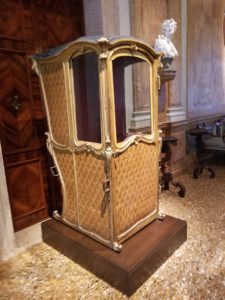

30 comments
1 pings
Skip to comment form
Goodness me! Well at least he answered Elizabeth’s question about the animals although personally I think I would be wary of going on excursions with him but I am sure Darcy can protect his Elizabeth. Will there be more of this lovely story?
Byron isn’t exactly a tame lion, Glynis! No wonder Elizabeth worries whether her children will be safe around him and his animals! Glad you enjoyed the story, and yes, there will be more!
And the Venetian story continues and I’m glad as it’s really fascinating and even Byron appears imagine that! I wonder what will happen next?
(coyly) Wait and see, Sophia! Glad you are enjoying the story, and you never know what will happen next when Byron is involved!
I like the parallels of Byron being persued by a mad woman and Darcy’s bachelorhood. This should allow Darcy to feel some sympathy for Byron, he had a similar experience prior to marrying Elizabeth.
Some people actually think Byron and Darcy are very much alike, Meg! Remember, Darcy calls poetry “the food of love.”
I wonder what would have happened had it not been Darcy from Pemberley and another English couple instead? What would Byron have done? What was his intent? Was he going to tell them to get out of his Italy? Wow… what a pompous ass. Anyway… I think he will find Darcy and Elizabeth Darcy to be a unique and unusually intelligent couple that will be a force to reckon with. Yep, that would be interesting. Thanks for sharing this excerpt.
Dear J.W. Garrett, Byron really loathed English tourists. I am proceeding on the assumption that he thinks better of the Darcys. I mean…that library! Glad you liked it, more coming.
A very similar parallel to celebrities today…! Only Byron would know of the greatest libraries in England or anywhere for that matter. I think their sojourn in Venice will be very enlightening for both Darcy and Elizabeth if spending time with Byron is part of it! Thank you for expanding on this story! Now I am curious about the monastery…
Thanks, Carole! I have actually visited the island of San Lazzaro so the details will be as accurate as I can make them. Can’t vouch for the plotting, but I will try!
Byron wasn’t a pompous ass. he was pursued. He had women sending him locks of hair and trying to catch his eye. He didn’t have to seduce women for they did it to themselves. Think rock star. Or Justin Bieber.
I don’t think he would have mentioned his illegitimate daughter.
Ada was 2 in December of 1817. Also, Allegra was born in January 1817 . The girls were 13 months apart in age.
Thanks for the clarifications, Nancy. I will try not to twist the truth too much! 🙂
A little excitement for the Darcys. At least Lord Byron is not a permanent neighbor of theirs in Derbyshire.
No, Lord Byron never lived in England again! But one thing I do know is that the Darcys will get back home safely. 🙂
How funny, Byron loathing english tourists, being one himself…
The Darcy’s must be quite content there were no tigers or wolf present although monkeys might make some mischief.
Wonder why Byron seemed to like the Darcy’s?
I think Byron felt he’d had a pretty raw deal in England, with his marriage ending so badly, and creditors and scandals everywhere. I’m guessing he would like the Darcys because they were such exceptional people – Darcy with his library and well-educated mind, and Byron would surely have found Elizabeth and her fine eyes attractive! I think any mother would be worried about wild animals next door! Thanks for reading.
Only Elizabeth would feel sorry for Byron! Yet he has made his own bed, and must now lie in it, even though it means being separated from his children. But those are the consequences for living a life of “free love” in the 1810s vs. the 1960s. 😉
I’m sure that Byron is thrilled to find such a well-educated English couple to show the sights of Venice. I loved that Byron knew the reputation of Darcy’s library more than his personal reputation, LOL!! So very Byron-ish!!
I do love Byron’s poetry, especially his book-length satiric poem Don Juan (pronounced “Don Joo-en” by the English), but his personal life was a mess–as was the case with most of the English Romantic poets; Keats and Shelley also lived short and tumultuous lives, mostly on the Continent after offending the English with their unconventional lifestyles which were splashed across the newspapers’ gossip columns. They were rather the Kardashians of their day–only they had intellect and true (yet greatly wasted) talent.
Thank you for this amazing story, Diana; I am very much looking forward to their outing and Elizabeth’s conversations with Lord Byron which will likely amaze and amuse the poet.
Warmly,
Susanne 🙂
I have read biographies of Byron and the group of English ex-pats who sometimes he spent time with during his phases of life while in Italy. The Venice period for Byron (as I recall) was a particularly hard one — he had one particular mistress but many sordid liaisons; he was starving himself and writing poetry through the nights. Teresa’s relationship with him provided a more permanent livable escape than the one he knew while around the Shelleys and their entourage.
Poems that he wrote while in Venice, especially any on what he saw (but I know this was a more mid-19th century approach) would give a feel of it.
Ellen – Byron’s adventures in Venice are so vividly recounted in his letters, I feel like I’m there reading about them. The main thing he was doing at the time of my story is studying Armenian with the monks on St. Lazzaro, but he also had the sordid swarms of mistresses, and the improbable menagerie. What a character. I bought a little engraving of the Mocenigo Palazzo and am waiting for it to come. Thanks for reading.
Beyond the crazy self-starving and eating binges, he was also drunk a good deal of the time.
No doubt!
Y’all are all too erudite for this country girl! I shall have to look for a bio on Lord Byron now! This was a delicious chapter Diana on the Darcy’s and Lord Byron. I look forward to reading more.
Thanks, Hollis! Reading about Lord Byron is always exciting – you won’t regret it! 🙂
What a delightful read. It was exquisitely English and lovlingly absurd and made me smile. Thank you.
My dear Nathalie, that is a truly delicious compliment that made ME smile! Thank YOU!
More please. Visit to the Armenian monks will be next? In the first episode of Victoria on PBS, Queen Victoria’s husband attends meetings with Lady Lovelace regarding the mathematical machine. Found this https://www.brainpickings.org/2014/12/10/ada-lovelace-walter-isaacson-innovators/.
Wonderful article, Joyce, thanks so much! Slight delay on story continuation as husband is in hospital after a fall. He’s not in danger and things will settle down soon, then back to writing!
That is the current season 2 episode 1.
I’m sure Darcy would have Latin beaten into him in the usual way, so he would have said “per annum”.
Yes, but your female authoress didn’t have Latin beaten into her, hence the oversight…
[…] https://austenvariations.com/the-darcys-and-lord-byron-in-venice/ https://austenvariations.com/the-darcys-and-lord-byron-in-venice-part-2/ https://austenvariations.com/the-darcys-and-lord-byron-in-venice-part-3/ https://austenvariations.com/the-darcys-and-lord-byron-in-venice-part-4/ https://austenvariations.com/the-darcys-and-lord-byron-in-venice-part-5/ https://austenvariations.com/advent-calendar-day-13-the-darcys-and-lord-byron-in-venice-part-six-2/ https://austenvariations.com/advent-calendar-day-20-the-darcys-and-lord-byron-in-venice/ https://austenvariations.com/the-darcys-and-lord-byron-in-venice-part-8-with-a-venetian-giveaway/ https://austenvariations.com/the-darcys-and-lord-byron-in-venice-part-9-diana-birchall/ https://austenvariations.com/the-darcys-and-lord-byron-in-venice-part-10/ https://austenvariations.com/the-darcys-and-lord-byron-in-venice-part-11-diana/ https://austenvariations.com/a-picnic-in-venice-part-12-of-byron-and-the-darcys-series/ […]